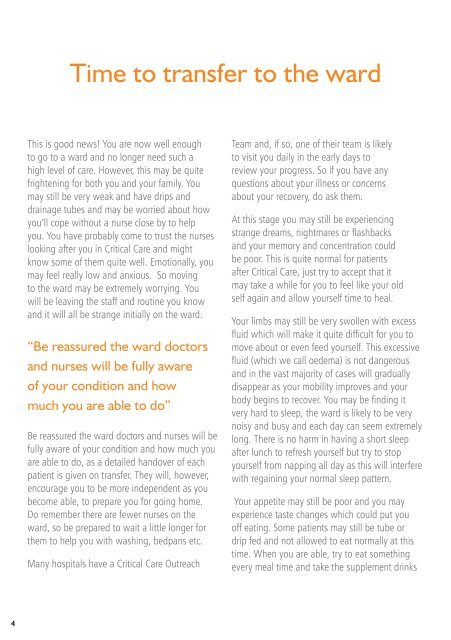SEPSIS Survivors Information
Sepsis-Survivors
Sepsis-Survivors
Create successful ePaper yourself
Turn your PDF publications into a flip-book with our unique Google optimized e-Paper software.
Time to transfer to the ward<br />
This is good news! You are now well enough<br />
to go to a ward and no longer need such a<br />
high level of care. However, this may be quite<br />
frightening for both you and your family. You<br />
may still be very weak and have drips and<br />
drainage tubes and may be worried about how<br />
you’ll cope without a nurse close by to help<br />
you. You have probably come to trust the nurses<br />
looking after you in Critical Care and might<br />
know some of them quite well. Emotionally, you<br />
may feel really low and anxious. So moving<br />
to the ward may be extremely worrying. You<br />
will be leaving the staff and routine you know<br />
and it will all be strange initially on the ward.<br />
“Be reassured the ward doctors<br />
and nurses will be fully aware<br />
of your condition and how<br />
much you are able to do”<br />
Be reassured the ward doctors and nurses will be<br />
fully aware of your condition and how much you<br />
are able to do, as a detailed handover of each<br />
patient is given on transfer. They will, however,<br />
encourage you to be more independent as you<br />
become able, to prepare you for going home.<br />
Do remember there are fewer nurses on the<br />
ward, so be prepared to wait a little longer for<br />
them to help you with washing, bedpans etc.<br />
Many hospitals have a Critical Care Outreach<br />
Team and, if so, one of their team is likely<br />
to visit you daily in the early days to<br />
review your progress. So if you have any<br />
questions about your illness or concerns<br />
about your recovery, do ask them.<br />
At this stage you may still be experiencing<br />
strange dreams, nightmares or flashbacks<br />
and your memory and concentration could<br />
be poor. This is quite normal for patients<br />
after Critical Care, just try to accept that it<br />
may take a while for you to feel like your old<br />
self again and allow yourself time to heal.<br />
Your limbs may still be very swollen with excess<br />
fluid which will make it quite difficult for you to<br />
move about or even feed yourself. This excessive<br />
fluid (which we call oedema) is not dangerous<br />
and in the vast majority of cases will gradually<br />
disappear as your mobility improves and your<br />
body begins to recover. You may be finding it<br />
very hard to sleep, the ward is likely to be very<br />
noisy and busy and each day can seem extremely<br />
long. There is no harm in having a short sleep<br />
after lunch to refresh yourself but try to stop<br />
yourself from napping all day as this will interfere<br />
with regaining your normal sleep pattern.<br />
Your appetite may still be poor and you may<br />
experience taste changes which could put you<br />
off eating. Some patients may still be tube or<br />
drip fed and not allowed to eat normally at this<br />
time. When you are able, try to eat something<br />
every meal time and take the supplement drinks<br />
4


